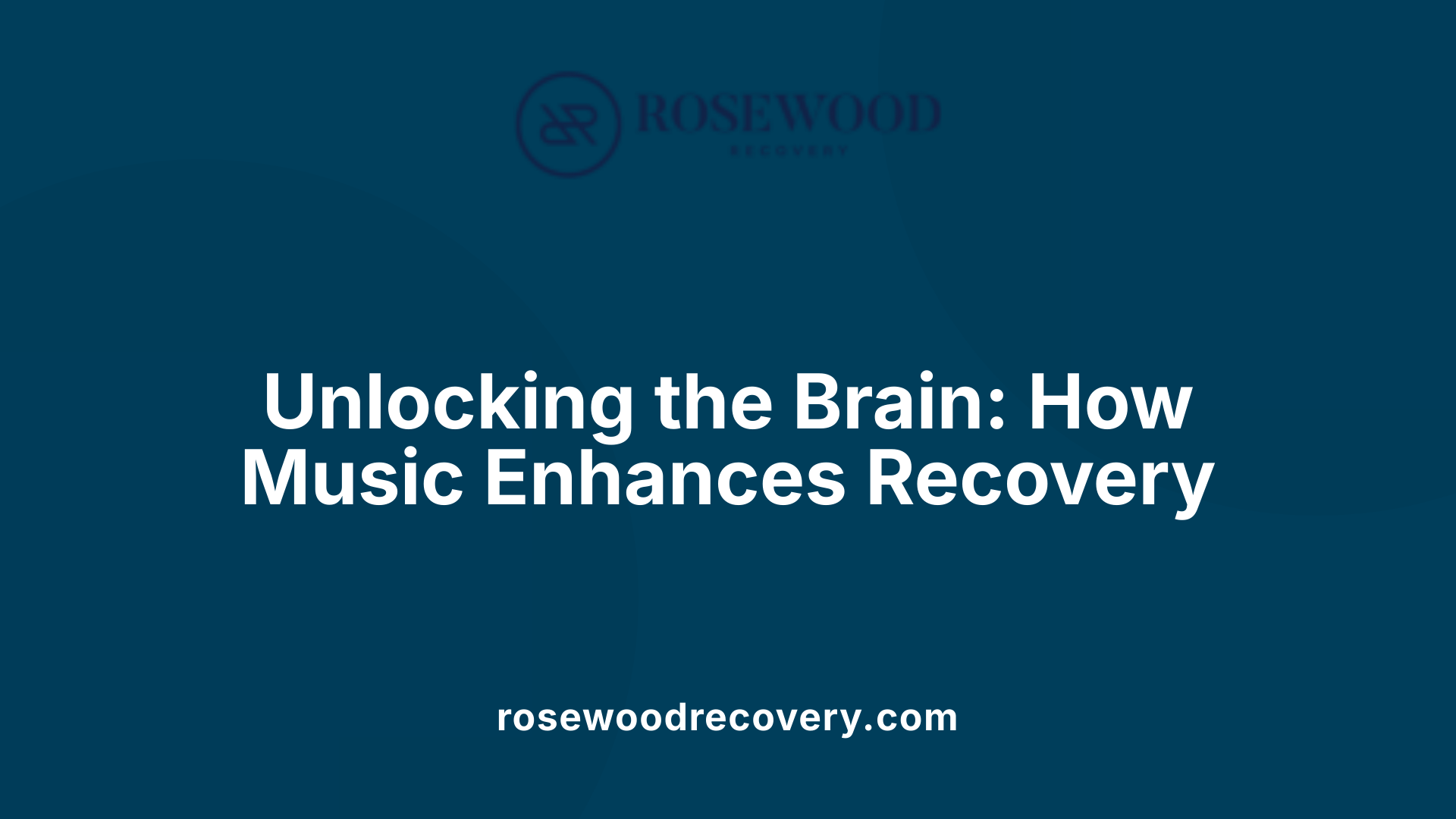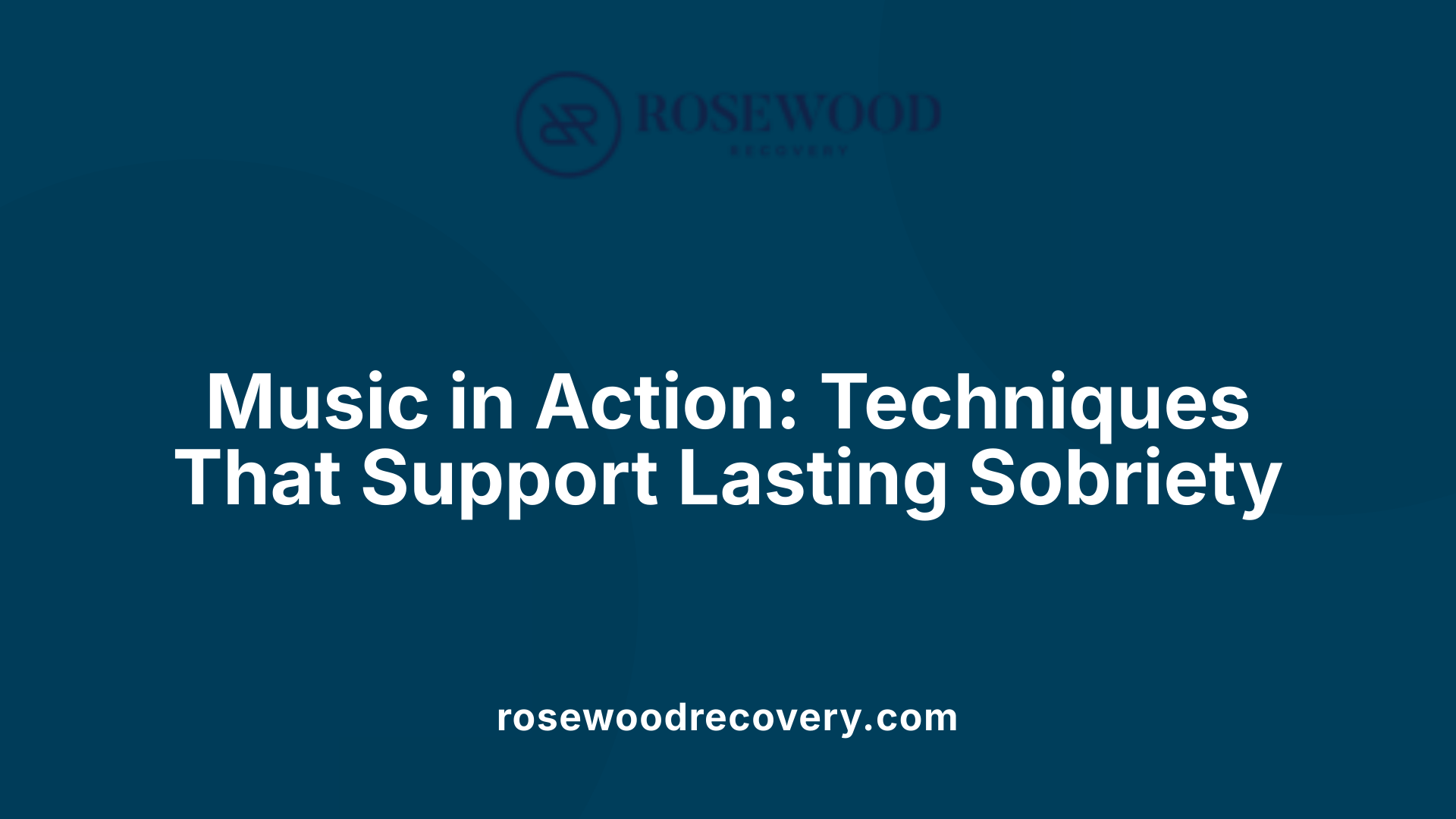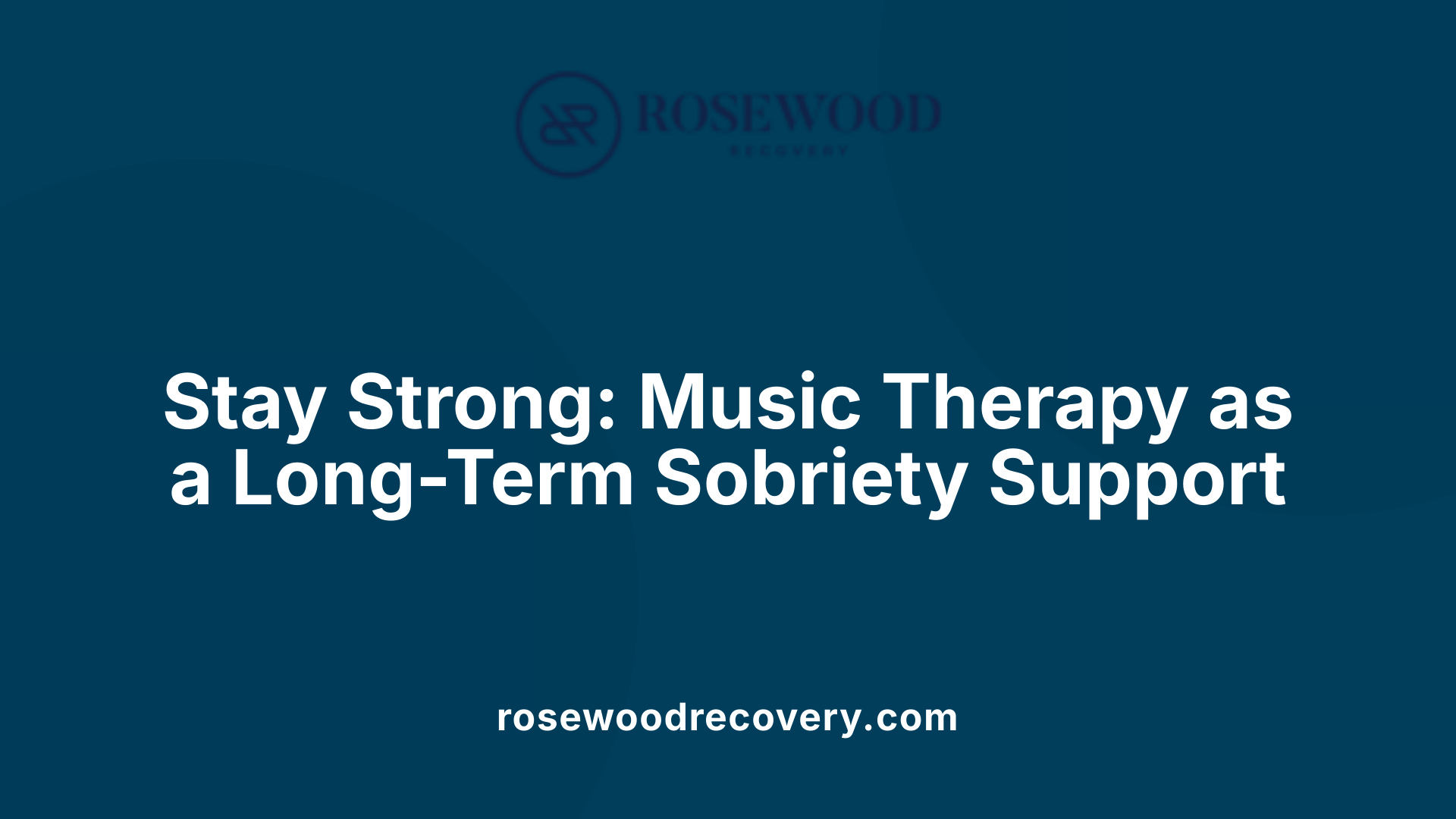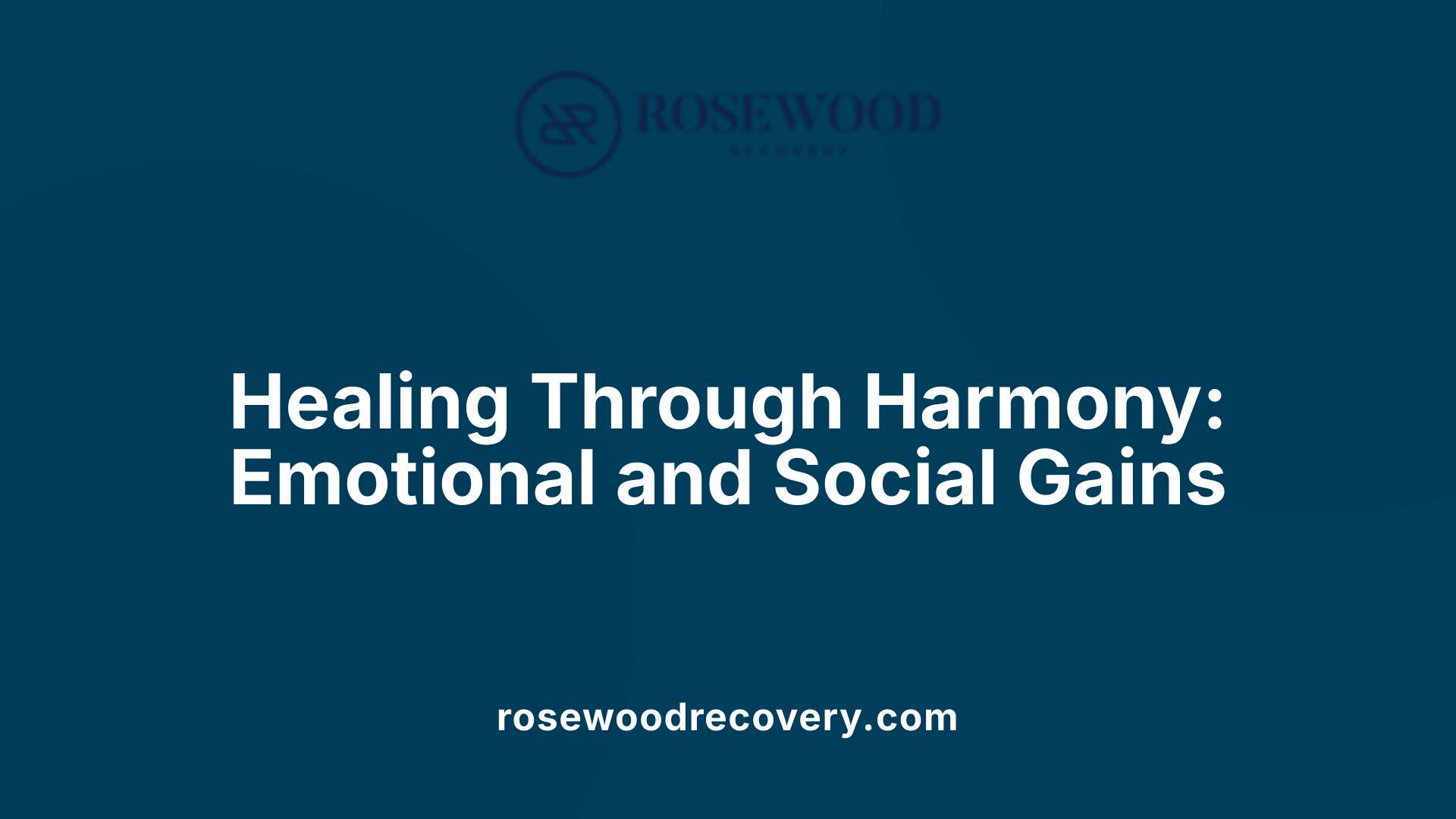Understanding the Role of Music Therapy in Building Sustainable Sobriety
Music therapy has emerged as a compelling, evidence-based approach to aid individuals in their journey of addiction recovery. By engaging multiple areas of the brain, fostering emotional expression, and cultivating social connections, music therapy supports the development of vital coping mechanisms, essential for long-term sobriety. This article explores how various techniques and the scientific basis behind music therapy contribute to emotional regulation, relapse prevention, and overall mental health in recovery.
The Neuroscience and Therapeutic Foundations of Music Therapy

What is the scientific basis and therapeutic effect of music therapy for individuals in recovery?
Music therapy is an evidence-based intervention rooted in neuroscience, demonstrating how engaging with music impacts critical brain functions and structures. During therapy sessions, musical activities activate regions involved in emotion, memory, and reward processing. This activation helps regulate mood, alleviating symptoms of depression, anxiety, and emotional distress common in recovery.
One of the fundamental mechanisms behind music therapy's benefits is the stimulation of dopamine release. Dopamine is a neurotransmitter associated with pleasure, motivation, and reward. When individuals participate in music-making, listening, or songwriting, their brains release dopamine, creating feelings of happiness and satisfaction. This natural reward system supports brain rewiring, guiding individuals toward healthier gratification pathways and reducing reliance on substances.
In addition to boosting dopamine, music therapy helps lower stress hormone levels, such as cortisol. By engaging in calming musical activities, individuals experience physiological relaxation, which diminishes anxiety and stress—the primary triggers for relapse.
Moreover, music offers a non-verbal channel for emotional expression. Techniques like improvisation and lyric analysis facilitate emotional processing, allowing individuals to confront trauma, guilt, or anger indirectly. This process fosters emotional resilience and aids in trauma healing.
When incorporated into broader treatment strategies, music therapy enhances emotional regulation, social connection, and personal insight. These neurobiological and psychological effects support sustainable recovery and improve overall mental health outcomes, making music therapy a vital complement to conventional addiction treatments.
Mechanisms and Techniques Supporting Sobriety

What are the mechanisms and techniques of music therapy that support sobriety?
Music therapy employs a variety of methods designed to enhance emotional regulation, foster stress relief, and support brain healing processes, all of which are crucial in maintaining sobriety. Key techniques include improvisation, songwriting, listening to music, and guided imagery.
Improvisation encourages spontaneous musical creation, allowing individuals to express and process complex emotions in a safe, non-verbal way. Songwriting provides a creative outlet for exploring personal experiences, catharsis, and setting future goals, fostering a sense of agency and hope.
Listening to calming or motivating music reduces anxiety and elevates mood, helping to manage cravings and trigger responses. Guided imagery, such as the Bonny Method of Guided Imagery and Music, stimulates mental visuals that support emotional integration and healing, addressing trauma and unresolved issues.
Neurobiologically, music activates brain areas associated with pleasure and reward, including the release of dopamine—the body's natural feel-good chemical. This activation mimics the effects of substances used in addiction, helping to rewire brain pathways towards healthier sources of gratification.
Through these practices, individuals develop stronger coping mechanisms, improve emotional stability, and regain self-control. Importantly, music therapy also encourages social connection through group activities, enhancing motivation and reducing feelings of isolation.
Overall, these diverse techniques work synergistically to support emotional healing and resilience, making music therapy a valuable component of comprehensive addiction recovery programs.
Developing Coping Strategies During Sobriety

How does music therapy facilitate the development of coping mechanisms during sobriety?
Music therapy plays a significant role in helping individuals in recovery develop healthy coping strategies. It offers a safe, non-verbal space for emotional expression and helps process deep-seated psychological issues linked to addiction. Activities like songwriting, improvisation, and attentive listening enable individuals to explore and express complex feelings such as guilt, anxiety, or anger, which might otherwise lead to relapse.
Engaging with music stimulates dopamine release, the brain's natural reward chemical, fostering feelings of pleasure and happiness. This reinforcement encourages healthier ways to satisfy emotional needs without resorting to substances. Through repeated participation, individuals learn relaxation techniques, breathing exercises, and emotional regulation skills that are crucial for managing stress and the triggers that threaten sobriety.
Music therapy also promotes social bonding through group sessions, building trust and communication skills. These social connections can serve as vital support networks, reducing feelings of isolation and strengthening resilience.
Furthermore, by exploring various musical styles and creating personal compositions, individuals reinforce their sense of identity and purpose. This process boosts motivation and encourages a positive outlook, essential components in maintaining long-term sobriety.
When integrated with evidence-based addiction treatments, music therapy enhances emotional and psychological well-being. Overall, it equips individuals with a diverse set of coping mechanisms that are adaptable, accessible, and sustainable, helping them face the challenges of recovery with confidence.
Prevention of Relapse and Promoting Long-term Sobriety

What role does music therapy play in preventing relapse and maintaining long-term sobriety?
Music therapy offers significant benefits in enabling individuals to sustain sobriety over the long term. Research suggests that it helps reduce cravings and boosts motivation for treatment. By stimulating dopamine pathways in the brain, music therapy triggers feelings of pleasure and reward naturally, helping individuals experience positive emotions without turning to substances.
The therapeutic activities involved—like songwriting, improvisation, and listening—provide a healthy outlet for emotional expression. These methods support processing unresolved trauma, stress, and other psychological issues that often serve as relapse triggers. During therapy, individuals explore their emotions and develop healthier coping mechanisms.
Group music therapy sessions are especially effective in fostering social bonds. They help rebuild trust, enhance communication skills, and diminish feelings of loneliness or social withdrawal common in addiction. These social benefits increase resilience and resilience that are crucial for staying committed to sobriety.
When integrated into a comprehensive treatment plan, music therapy enhances emotional regulation and self-awareness. It supports emotional healing by addressing underlying trauma and stress, which are often barriers to sustained recovery. Additionally, it helps individuals develop a sense of purpose and connection, both essential for long-term success in recovery.
Overall, incorporating music therapy into addiction treatment creates a supportive environment that nurtures emotional well-being, decreases relapse risk, and inspires motivation for ongoing change. This holistic approach helps individuals build a new, healthier identity, promoting sustained sobriety and mental health resilience.
The Broader Impact: Emotional and Social Benefits of Music Therapy

How does music therapy support mental and emotional health during recovery?
Music therapy acts as a powerful tool in addiction recovery by providing a safe space for emotional release and self-expression. It helps individuals process feelings that are difficult to articulate through words, such as guilt, anger, or trauma. Activities like listening to calming music, songwriting, and improvisation stimulate emotional and cognitive regions of the brain, promoting relaxation and mood regulation.
Conducted by trained therapists, music therapy is customized to meet each person’s unique needs. It encourages self-awareness, helping individuals understand their emotional landscape and build resilience. Additionally, it lowers stress hormones like cortisol, reducing anxiety and physical tension, which are common in recovery.
Group sessions foster social bonds, reduce feelings of isolation, and create a sense of community—vital for enduring sobriety. Overall, music therapy enhances mental health by supporting emotional stability, reducing stress, and reinforcing a positive identity.
What are the different types of music therapy used in addiction recovery?
Various music therapy techniques are employed to aid addiction recovery. Receptive methods include music listening exercises, music and imagery, and lyric analysis, which evoke emotional processing and relaxation.
Active approaches involve improvisation, songwriting, and instrumental playing, encouraging personal expression and social interaction. Techniques like the Bonny Method of Guided Imagery and Music (GIM) stimulate mental imagery, facilitating emotional and spiritual healing.
Some therapies, such as Nordoff-Robbins improvisational therapy and Orff-Schulwerk, utilize creative musical activities to develop trust, reduce cravings, and manage triggers.
Integrating these methods with evidence-based treatments like Cognitive Behavioral Therapy (CBT) or Dialectical Behavior Therapy (DBT) enhances motivation and emotional regulation.
Activities are tailored to support developing healthy coping strategies, processing difficult emotions, and fostering self-awareness, ultimately strengthening resilience against relapse.
| Type of Music Therapy | Main Techniques | Goals | Relevant Contexts |
|---|---|---|---|
| Receptive Music Therapy | Listening, Imagery, Lyric analysis | Relaxation, emotional processing | Stress reduction, trauma support |
| Active Music Therapy | Songwriting, Improvisation, Instrument playing | Emotional expression, social bonding | Addiction, mental health |
| Guided Imagery & Music (GIM) | Focused imagery through music | Spiritual and emotional healing | Deep emotional work |
| Neurological & improvisational | Improvisation, Creative arts | Developing trust, reducing cravings | Neurological and developmental settings |
In summary, music therapy in addiction recovery uses a versatile array of strategies to foster emotional well-being, strengthen social connections, and address underlying trauma, making it an essential component of holistic treatment approaches.
Harnessing Music for Lasting Change in Recovery
In summary, music therapy offers a dynamic, scientifically grounded approach to supporting individuals on their sobriety journey. By activating reward systems, facilitating emotional and psychological healing, and fostering social bonds, music therapy builds essential coping mechanisms that help prevent relapse and promote long-lasting recovery. As part of comprehensive addiction treatment, this holistic approach nurtures resilience and personal growth, empowering individuals to find joy, purpose, and connection in sobriety.
References
- How Music Therapy Can Aid in Addiction Recovery
- Music Therapy For Substance Abuse Treatment
- The Role of Music Therapy in Your Mental Health Recovery
- Music Therapy and Addiction Treatment
- Coping Skills in a Music Therapy Program
- Music therapy for people with substance use disorders - PMC
- Music Therapy Benefits in Addiction Recovery
- Music Therapy In Addiction: Meaning, Benefits, And Role
- Music Therapy: Types & Benefits

.jpeg)
.jpeg)

